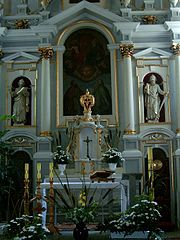
A History Of The Mass And Its Ceremonies In The Eastern And Western Church -Rev John O'Brien A.M.
WHY THE CHURCH RETAINS THE USE OF THE LATIN IN HER SERVICE
The Catholic Church celebrates in Latin for a variety of reasons:
First. Because she did so in the beginning; and as she never changes her faith, she has never deemed it advisable to change her language. If her sacred language changed with those that are changing around her, there would be no end to the confusion that would result, and much disedification would unavoidably be given by using words and phrases in the hearing of the people to which the grossest meanings are sometimes attached.
Secondly. As order is heaven’s first law, uniformity seems to be the first law of the Church, for which reason she makes it her endeavor to have her greatest charge, the due and respectful celebration of the Adorable Sacrifice of the Altar, conducted with the same ceremonies and said in the same language everywhere. This she could not do unless she had fixed on a common language.
Thirdly. Unity in respect to language goes a very great way in preserving unity of belief. A writer of high repute (Porubszky, Jure suo Ecclesiast., p. 854) declares as his firm conviction that the various churches of the East which have severed their connection with the centre of unity, Rome, would hardly ever have done so had they been required from the beginning to make Latin their liturgical language. National languages always pave the way for national churches.
Fourthly. By preserving the Latin in her Liturgy, and requiring her ministers to cultivate it, the Catholic Church has secured for herself the accumulated literary treasures of eighteen centuries of Christianity. By this she has free access to the writings of some of the most illustrious doctors of the Church, to canon and civil law, to the decrees of ancient councils, and to many other documents of value which would have otherwise been totally out of reach. For which reason alone our Holy Church should receive the praise of Christendom. Hallam, in his Middle Ages, could not hide the fact that the sole hope of literature in these times depended principally on the Catholic Church, for wherever it existed the Latin language was preserved.
Copyright ©1999-2023 Wildfire Fellowship, Inc all rights reserved

 Keep Site Running
Keep Site Running